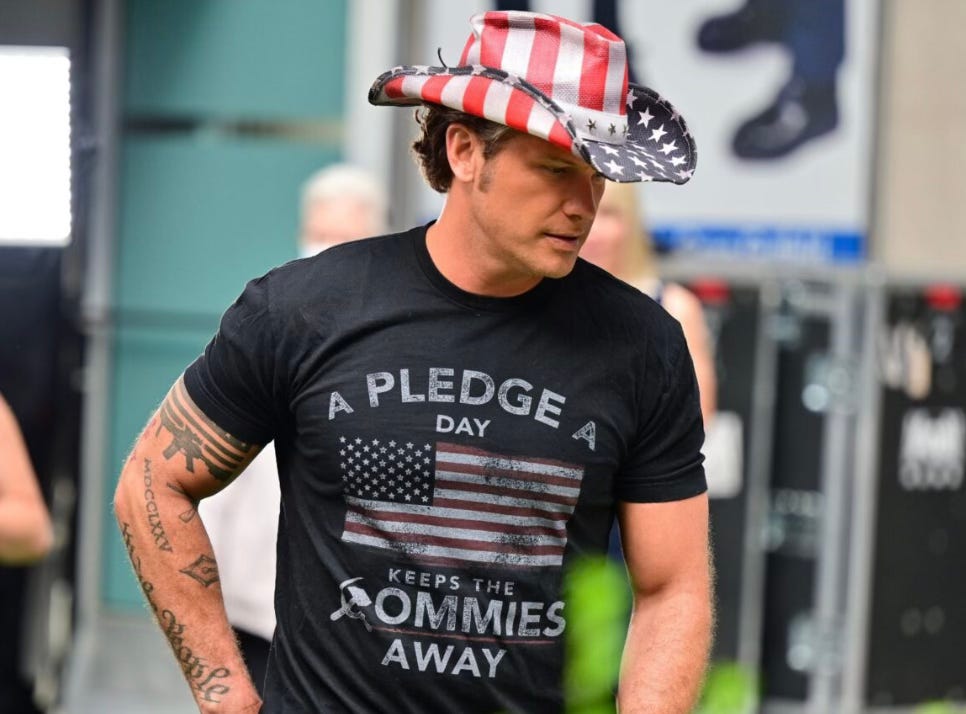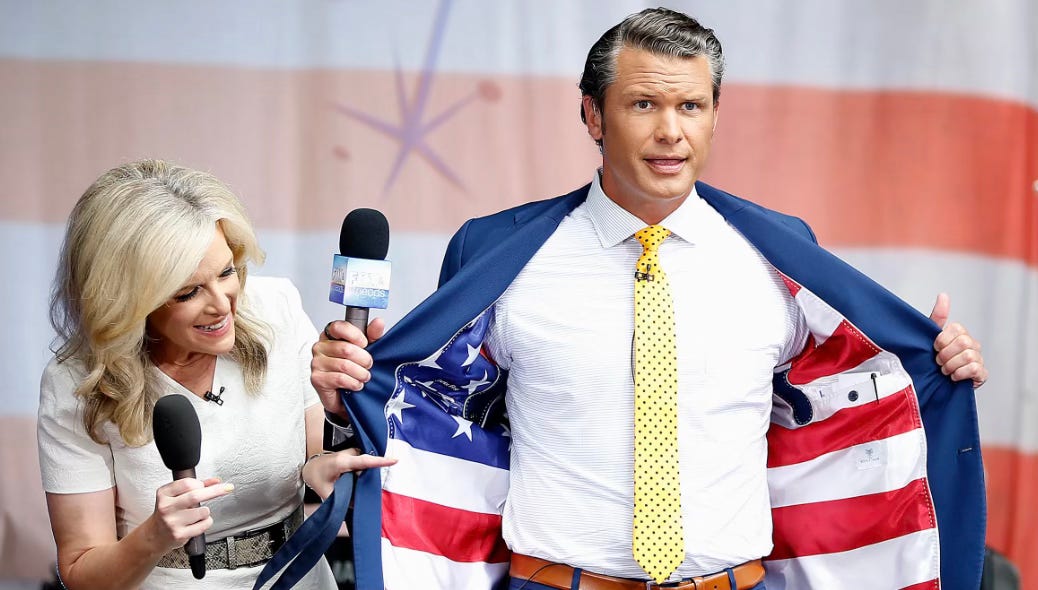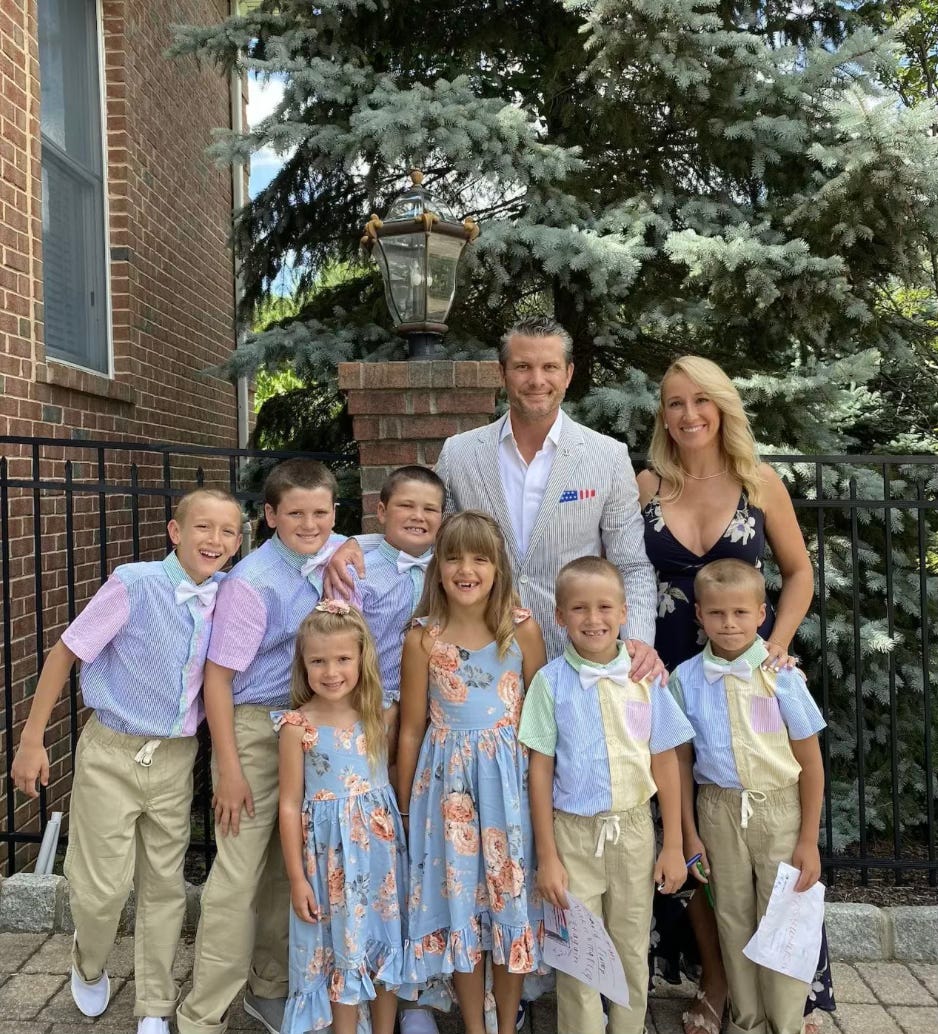Manning up (and bringing us all down)
For your consideration: U.S. Secretary of Defense Pete Hegseth
“Each ‘storyboard’ (an Army PowerPoint slide that summarized missions…) that confirmed that our little S5 team was providing intel that led to kills of bad guys built my confidence like I was back in high school draining three-pointers…. I realized that perhaps my planetary purpose was to proactively, politically, and then militarily destroy Islamist radicals. Feeding a well-oiled killing machine, now that’s my jam.”
-United States Secretary of Defense Pete Hegseth, recounting his military service.
By the time you read this, Pete Hegseth may or may not have a job. Who knows, by the time you read this, Pete Hegseth may have been fired, or given a Trump Medal of Freedom, or been named God Emperor of Greenland. I’m out of the prognostication business, at least for the foreseeable future.
For now, at least, Pete Hegseth is still in charge of the largest military on the planet. He is, by all accounts, making an absolute mess of the place. I’ve hesitated to write much about Secretary Hegseth, mostly because he’s far too obvious of a target. You want to talk flaws? Pete Hegseth has them. Perhaps all of them. He’s an empty suit talking head with a track record of running organizations into the ground. Rhetorically, he has only two gears: pompous bloviation and aggrieved accusation. He sexually assaults women, goddamnit. He mother once wrote a letter excoriating him for being the kind of guy who “belittles, lies, cheats, sleeps around and uses women for his own power and ego.” His mother! I was going to title this piece “Mamas, don’t let your babies grow up to be Pete Hegseth,” but his own mama already made the argument for me.
You’ll note that I didn’t talk about the alleged drinking problem. We all have people in our lives with drinking problems. Some of you may be fighting your own demons. Addiction itself isn’t a moral failing, nor something for the rest of us to gloat about. Now, as for a public figure’s continued petulance about a drinking problem that likely exacerbates (and is exacerbated by) his other misanthropic tendencies, that’s a different matter, but not the point of the piece.
We will get to the Signal chats, though. Just not yet.
First, I want to talk about this now forgotten exchange from Hegseth’s confirmation hearing. The questioner is Senator Tim Sheehy from Montana, a deeply Hegsethian figure himself. Have you ever witnessed a gender affirming line of questioning from a Senate dais? Forget drag queen story hour; now here’s a performance.
In order, here are the first three questions posed by a sitting Senator to his guy, the would-be commander of America’s armed forces.
-How many genders are there?
-What is the diameter of the rifle round fired out of an M4, an A1 rifle?
-How many pushups can you do?
It is, of course, a profoundly unserious exercise (I will spare you Senator Sheehy’s pronoun joke; Hegseth thought it was hilarious). It is corny and sweaty and bro-y in the worst possible way. After they finished, Sheehy claimed that Hegseth’s ability to answer his gauntlet of Tinder-profile-from-hell questions was proof that he could think like a soldier and, as such, keep working class service people safe. You know, in contrast to the fat cats in Washington, what with their love of pronouns and their disdain for ammunition.
The faux-populist stinger makes for a richer text, but it doesn’t distract from the broader game here: Two preening tough guys— men who may wear suits but who assure you that they’d be more comfortable shirtless, pecs gleaming in the C-Span lights— peacocking for one another in a wood paneled hearing room. They talk a lot about warfighters, the Senator and the TV Star. That’s who they are, mind you. Warfighters and protectors. Real men. Our last line of defense when the laws of polite society break down. “How many push-ups can you do?” is one hell of a Rosetta Stone question. Only real men know how to answer it, just as only real men know to ask it.
The guys did good by one another in that hearing, Tim Sheehy and Pete Hegseth. Egos were massaged. Insecurities (never admitted out loud) were assuaged. America was God blessed.
“[An] unholy alliance of political ideologues and Pentagon pussies has left our warriors without real defenders in Washington.”
That’s another Hegseh quote, in case it wasn’t obvious. It’s from his most recent book, The War on Warriors. As is probably clear from the prose, Hegseth clearly intended The War on Warriors as a manifesto— his argument for why a guy like himself needs to clean up shop at the Department of Defense. Every chapter ends with a battle cry. Of freedom? Not quite.
“…The blood of America’s daughters will be on their hands.”
“…Our job is to kill the enemy— and when we get rid of the bullshit consuming the military right now, we are the best in the world.”
“…Our boys should not fight by rules written by dignified men in mahogany rooms eighty years ago. America should fight by its own rules. And we should fight to win, or not go at all.”
In fairness to the author, there are manifesto-ish arguments throughout (why DEI should be eliminated, why trans service people should be fired unceremoniously, where those dignified men in mahogany rooms can shove it, etc.). That’s all window dressing, though. The book is clearly a memoir. It’s the story of a man who discovered, through his military service, not only a chance to be a part of something bigger than himself, but verification that he, personally, was one of the most manly men in the history of the world. It was the end of history as we know it, and Hegseth felt AFFIRMED IN HIS GENDER.
Why does the United States even have a military, per Hegseth? For the boys!
“The military has always been about social engineering— forging young men (mostly) with skills, discipline, pride and brotherhood. It takes average American boys, breaks down their body and mind, and builds them back up into members of a war fighting team.”
As he was saying…
“Americans used to love cowboys. Now they seem like a quaint part of our past. We used to see the dignity and value of men who got up early, made real things, lived by a code, and worked with their hands. Cowboys were our heroes, as were soldiers, explorers and astronauts. Now? It’s Tony Fauci and Michelle Obama who get the hero treatment.”
Now there’s the Willie Nelson joke I didn’t get to make earlier. Mamas, please let your babies grow up to be Tony Fauci and Michelle Obama. That’s what we leftists are always saying.
Listen, I fully realize that I’m a flawed interlocutor on this topic. Not only have I never served in the military, I’m a full-on conscientious objector. I’m both a pacifist (though Hegseth would no doubt use a different “p” word) and a far left critic of American empire. I can more easily imagine myself standing in front of a tank than driving one. But also, I live a blessedly interconnected life, which means that I love many, many people who have served or are serving in the U.S. military, including many of you reading these words right now. I have no doubt that there’s many aspects of your military service that fill you with pride and meaning: the challenges you’ve overcome, the dangers you’ve faced, the bonds you formed with your colleagues and their families.
If Hegseth were writing about all that, I’d get it. I love nothing more than puncturing the myth of individualism. It feels incredible to be a part of a team, an actual team. And I may not be a military guy personally, but again, that aspect of the enterprise makes complete sense.
It’s clear, though, that when the Secretary of Defense first enlisted in the Army, he wasn’t seeking belonging or community or help affording college. He needed, just as he still needs today, for the rest of us to genuflect in his direction and tell him not only thank you for your service but thank God you channeled your aggressive, virile manliness into the Holy work of protecting us, for that is what a man does.
The book’s clearest through line is Hegseth’s apoplectic anger at having to share the title “soldier” with undesirables: women, trans people, queer folks who don’t hide it, Black people who don’t constantly assure him that racism is over. If all of those people— gays and girls and commies— can be soldiers, then Hegseth’s go-to source for fluffing up his fragile masculinity disappears into thin air. If they’re in the club, then what was he really doing in Afghanistan? Mostly powerpoints. You know, like a girl.
Hegseth’s chapter on women in combat is a particularly revealing Gordion knot of misogyny and illogic. He offers plenty of reasons why women shouldn’t fight alongside men like him (variations on: “they’re weak”) but the one he comes back to most fervently is the assertion that men are, by their nature, aggressive brutes who are only saved by their shared calling to protect women (from whom? a decent question). Per Hegseth, if you suddenly tell the ogres that women don’t need our protection, well… you’ve pierced the veil. There’s no telling what we might do.
If that all sounds like gross abuser’s logic, well, that’s accurate. But it’s also the core lie of patriarchy generally: This whole structural trap may be a yoke around our necks, but don’t you dare step outside of it. Don’t. You. Dare. You need it. It’s what keeps us safe, actually. Never mind that it’s killing us. Just give it another shot. Don’t leave it, now. Not after what we’ve been through.
And so there you have it. That’s the prison that Pete Hegseth has made for himself. He’s like a shark who can’t stop swimming. The minute he stops showing the world that he’s a tough-as-nails warrior man, he ceases to exist.
That’s the piece missing from most analyses of those big dumb Signal chats. Yes, Hegseth isn’t the sharpest strategic mind on the block, but ineptitude alone doesn’t explain why he keeps setting up these unnecessary text parties. Why would somebody be that reckless, over and over again? Why indeed, unless they so desperately need their buddies to see that I’m the one doing the wars now, you guys. Check out who’s got his finger on the death button. Pete Hegseth, that’s who. The warrior king. He alone knows when our missiles strike the Houthis. They’re his missiles. He commands them. Don’t point out the obvious insinuation here. Just go with it. The point isn’t who dies, it’s who kills them. Pete Hegseth: soldier, patriot, but above all else, man.
Recently, I’ve been fortunate to participate in a number of good faith conversations about this moment in American masculinity. One criticism that’s been leveled my way is that while I offer a lot of critiques of guys like Hegseth, J.D. Vance and Joe Rogan, I don’t offer wayward young men a masculinity-centric alternative. It’s a decent critique, because it’s true. There very well may be plenty of guys who need an off-ramp from Hegsethian masculinity that still looks and sounds more dude-ly than anything I have on offer. The problem is, I’m not sure that’s the answer. I’ve found— both in navigating my own relationship to gender and in offering advice to other boys and men— that the more we talk about “how to be a man” specifically rather than “how to be a decent, loving person,” we end up in a place that’s both overly solipsistic and unhelpfully essentializing. We keep on reinforcing the myths we need to puncture.
But the critique still stands. If I don’t have a man-specific message for the young guys, what do I have? Hegseth ends his book with a personal appeal to his sons (Gunner, Jackson, Boone, Luke and Rex). What do I have to say in response? Me, a hot dog fingered middle school gym drop out if ever there was one. If Hegseth is offering young men the siren song of aggression, domination and unfettered machismo, how can I compete with that?
Actually, I’m not so sure I need my own counter-proposal. I just have to point to Hegseth himself. Young men, is this what you want from your life? To be so addicted to a cult of performative masculinity that you have to constantly re-justify what a tough, violent caveman you are? Jeez, that sound so exhausting. Young fellas, I’m not saying you can’t love lifting weights or building things with your hands. If that brings you joy, go to town. But if you’re doing any of that to prove something about your manhood, you’re never gonna be satisfied (to point out but one obvious reason why, cis men aren’t the only folks who enjoy getting swoll and cutting boards with table saws).
You know the deal with treadmills, right? You never actually reach the destination. You just run forever until you collapse. Except in this case, since running in place means constantly flaunting your imagined power over others, there are other casualties when you fall. So many casualties.
I’m not perfect, and goodness knows Pete Hegseth doesn’t respect me, but I can tell you this. Only one of us is living his saddest, most Sisyphean life in public. Only one of us is going to kill himself trying to prove his manliness. And most of all, only of us risks taking all of us down in the process.
Pete Hegseth is right about one thing. He’s a warrior. The only problem is, his lifelong adversary has been his tether to the rest of humanity— his sense of empathy, care and interdependence. Those are long dead. All that remains now is the battle. Whether he keeps his job or not, it’s all the same. The warrior stands before us. Cocking his fists. Assuming the stance. And punching himself in the face, over and over again.
End notes:
Registration for the latest round of Barnraisers classes (on community building!) are closed, but I promise there will be new announcements coming soon. If you’re on the interest list, you’ll find out as soon as everything is finalized.
I know that I mentioned this in the header for free subscribers, but I legitimately feel so lucky to have this job (a real day job! organizing and writing and sharing all this with you all!) thanks to the generosity of paid subscribers. One unavoidable aspect of that job, though, is that in order for it to not disappear into the ether (both for me and my colleague Carly), I need a few new folks every week to say “yes, I can help.” This is especially true since every week there are a few former subscribers who, understandably, have to take a break (“churn” they call it, a term I understand because I live in Wisconsin where butter is made). Regardless, I know I ask every week, but that’s literally how I keep the lights on, so thanks for considering.
Oh my goodness, are you ready for an incredible “Musk and Trump don’t care about you” sticker in the wild this week? This sticker was placed at the entrance to the Mother Baby Center at the Children’s Hospital of Minneapolis. That’s cool, of course, but do you know what’s cooler? The incredible human being who placed it there did so WHILE SHE WAS LITERALLY ON HER WAY TO GIVE BIRTH! Jeez Louise. (BTW the link to get a sticker is here, but I ask for your immense patience because I’m almost at 1000 requests and I’m doing my best to get them all out! What a great problem to have!).
This week’s Song of the Week: “My America” by Adeem the Artist. You know what’s a whole lot better when you strip away the nonsense around it? Gender, for one, but also patriotism. What’s left on the other side is something that sounds like this— empathy, a shared gray area, and the ability to look at the world through somebody else’s eyes. Lovely tune, this one. The kind that can only come from an open heart.
The full song of the week playlist is on Apple Music and Spotify.







In reading this essay, I couldn't help but reflect on the friends I have who have served in the military, and the ways that they are the antithesis of what we see in Hegseth because they have embraced care, empathy, and interdependence. And the throughline I see is that they have done the work to know who they are and what is important to them such that they don't care how they are perceived by those who don't know them well. My best friend's husband who keeps a spotless kitchen and who trains dozens of teenage recruits in discipline. The best man in our wedding, the Army pediatrician who worries about tiny 2 lb babies and kept all our crappy college cars running. My husband's childhood friend who was deployed so many times that no one can keep track and who talks openly about the scars on one's soul that taking a human life leaves (and who has no patience for anyone doing anything stupid with a deadly weapon). We're all spread out over the country these days because that's what life in the military requires these days, but I remember a recent conversation with a friend whose oldest son is nearly 14, where she lamented that we couldn't all spend more time together because she really wishes her kid had more time to see all the different models of how to be a man. When I think about these friends, I see men who have chosen to believe that caring for people and relationships matters, and that caring is a strength, not a weakness. (And thus these tend to be people in well-connected networks of family and friends that look out for each other.)
Your essay makes me think, honestly, about the difficulties that an excess of choice can create for people. Much better writers than I have talked about the anxiety created for many American women post-Second Wave Feminism who have been told that they can "be anything", while at the same time being shackled by all the ways in which those expanded choices are still constricted by the realities of living in patriarchy. You can, as the old advertisement said, "bring home the bacon" in so many more ways now, but you better be ready to "fry it up in the pan" when you get there, because that's also still your job. In the face of the plethora of (weirdly bank-handed) choices, many women feel paralyzed. Though, to my mind, it's less about the choices available (such as they are), and more about the way they are layered on top of all the traditional expectations of women that persist.
In the face of that very gendered burden, is it any surprise that many women are either a) susceptible to trad wife propaganda, which purports to eliminate their anxiety by returning them to the simple clarity of patriarchal expectation, or b) resentful of a feminist movement that has yet to "fix" thousands of years of patriarchy? Easier to just buy that any despair you feel as a woman in the face of it all is a signal of your failings as an individual, rather than a systemic failing that you will likely be subjected to for the entirety of your life. Be a feminist and court despair all your life (she says as a lifelong feminist)!
It seems like, for men, there is a flip side to this conundrum. Post-Second Wave Feminism they've been encouraged to be more emotionally complex, more accountable, more vulnerable, more engaged in the daily, intimate maintenance of families and relationships and community, all while moving through a patriarchal world that still devalues all of those things systemically and doesn't teach anyone how to do any of it (men or women, honestly). So, they still have to figure out how to "be men" in a world that has very narrow ideas of what that means, at the same time that they're expected to be more than that, with very little guidance about how.
Add to that a culture that is so judgmental and essentialist around bodies (Female bodies can make babies and are subject to hormonal cycles! They must all be mothers and crazy to boot! Males have a preponderance of testosterone! That must make them natural warriors and dominators!) Young men aren't actually given nuanced guidance about how to live with the ebbs and flows of being in male body without just being an aggressive asshole because you can. Is it any wonder that the Pete Hegseths of the world want to buy into a simplistic, performative narrative of masculinity that lets them avoid all the complications of figuring out how to be a person navigating this world with billions of other complex, imperfect, overburdened, confused people? Because that shit is really hard, and never stops being hard.
None of this is an excuse for Pete Hegseth. He's a small-minded, weak-willed, puppet of a person, playing a Real Boy for all to witness. But I think we do ourselves a disservice if we see him as special in his awfulness, rather than simply a particularly well-rendered symptom of a systemic conundrum that we're all responsible for perpetuating and fixing, to the extent that we can, while we're still here.